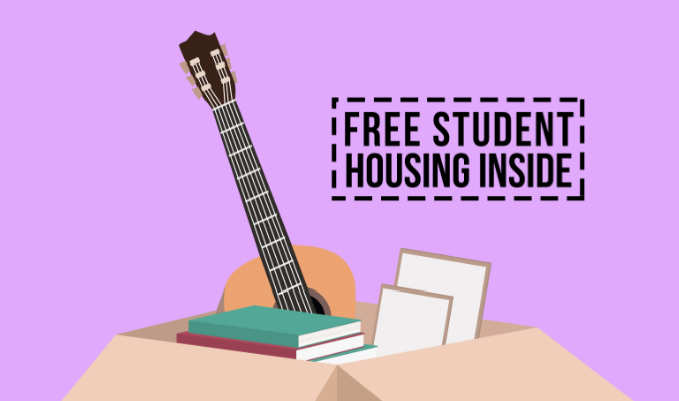
A student’s perspective on housing
By Mercedes Deutscher, News Editor
One of the first major life decisions that young adults make is moving away from the family home.
There are several reasons why people do this. Sometimes, students go to post-secondary either far from their neighbourhood or even out of province or country.
Sometimes students leave home under duress. Perhaps they have recurring issues with their family where they are either forced to leave or would rather leave than stay.
Or sometimes it’s for other reasons. Maybe all of your friends have moved out, or you’re just looking for a place to call your own.
The struggle with finding housing
Living on your own is daunting. I was 17 when I first moved out of my mother’s place. Despite managing to find a steady source of income, I needed to stay at my best friend’s house for six months until I was able to find a place to live.
Yet the hunt for my first place was stressful. Despite it being illegal for a landlord to deny housing to someone due to their age, I found myself the victim of ageism far too often. Some would hang up the phone as soon as I told them my age, while others refused after I went for a tour of the suite. Because I was then in high school and a young person, I was assumed to be irresponsible.
Perhaps I reminded my first landlord of his own daughter, or perhaps it was the ombudperson I brought along to the viewing with me, but eventually I was able to find a place.
I was fortunate. I found a large one bedroom suite that included laundry, heat, water, hydro, internet, and cable for $650 per month. It was a nice looking suite in a quiet Delta suburb.
Still, there were flaws in the process. Had it not been for the hospitality of my friends, I may have been forced to take a place that wasn’t ideal for me. Even with a great suite, I still had to make a near-hour commute to get to Douglas College, and even longer to get to Vancouver.
Some of the places I saw were places that I wouldn’t have recommended anyone to live in. One had such a poor layout that the tenant would have had to squeeze past the refrigerator to access their bedroom. Other were in unsafe neighbourhoods. Some were in terrible condition and had only one entry into the suite (a suite that does not have two or more entrances is considered illegal).
Young adults finding housing often have to make great sacrifices. After over two years in my first suite, I made the move to Vancouver. I wouldn’t have been able to make the move without a roommate, as most suites cost well over $1,000. We found a two-bedroom suite on the outskirts of Vancouver for $1150. It’s much smaller than my one bedroom suite, we need to pay for our own internet, and we only get (pay) laundry access once per week. Yet I can get to my work and school within 30–45 minute via transit, which would have been impossible back from my first place.
The struggles I found looking for a home are ones that are shared by young adults everywhere in the Lower Mainland. I spoke to three young adults on their housing struggles, who requested their names changed.
“Right now with the rental market the way it is, its nearly impossible to actually get a decent place to live,” said Caroline, age 20. “One of those reasons is that vacancy in Vancouver is trash so landlords can hike up the costs. Then there’s that loophole where if you sign a one year lease, they can hike the rent up higher than the percentage allowed by the residential tenancy board. We’re talking like, a lot higher—closer to 20 per cent in a lot of cases.”
Allison, age 17, expressed her frustrations from finding a suite with her boyfriend.
“It’s impossible to live alone. It’s hard to or impossible to find a place that’s reasonable and doesn’t have either insane amounts of traffic; moldy, rotten, worn down place; or you are already connected with the owner.”
“Also, landlords thinking they’re blessing you by adding $250 plus onto the rent and saying ‘but everything is included.’”
Greg, aged 22, recently bought a condo in Delta.
“I got to say that it’s really expensive for me. Between the down payment and all the saving I’ve had to do, unless I get a roommate to help pay for my mortgage, I may have to move back to my parents and just pay for the mortgage cause that’ll take most of my paycheque. I do have a full time job as an electrical technician.”
For a majority of students, owning a home is simply unrealistic, especially in Vancouver.
“Owning my own place is a long lost dream too far in the future to even think about,” Allison added.
As for Caroline, she considering moving to Edmonton after she finishes her degree. Vancouver housing prices are pushing her out of the city.
According to Generation Squeeze—a nonprofit campaign for affordability—young Canadians will have to wait much longer than their counterparts did in 1976. Back then, a person had to usually save up for five years in order to be able to afford the down payment on a home in Canada. Now, it takes least 12 years, and up to 23 years if they are looking at houses in Vancouver.
Know your rights and responsibilities
Yet with all of that said, younger people are more susceptible to fall victim to bad rental agreements. With less income to put towards rent, young tenants often settle for unkempt and illegal suites.
The Residential Tenancy Act only affects those who have a direct legal relationship with their landlord. If you are subletting from a roommate, you do not have the same legal protection.
People looking to rent should know that they have protection from discrimination. Aside from factors of race, gender, sexuality, age, ability, etc., students should know that they cannot be refused housing if their source of income is legal (including income assistance and employment insurance,) nor can they be refused housing for having a child.
New renters need to be cautious in regards to paying rent. A landlord has a right to evict you within 10 days if your rent is late, or if your utilities are 30 days late. This applies even if there is an issue with the landlord receiving the rent (for example, an e-transfer failed or it got lost in the mail). The only way this can be voided is if all overdue rent and utilities are paid within 30 days of receiving an eviction notice. Ensure that any and all of your roommates get their portion of the rent in on time as well—just because you paid your rent on time doesn’t mean that you are exempt from eviction if your roommates don’t.
Still, there are situations where you could withhold rent. As a tenant, you are not financially responsible for property repairs. If you need to cover the costs of a repairs and your landlord refuses to reimburse you, you may legally withhold what you are owed from the rent. You may also withhold money if your landlord illegally increases your rent (your landlord can increase rent once per year, and by no more than the maximum percentage allowed by the Residential Tenancy Act in that year).
Residents of a property are expected to behave a certain way. You cannot make excessive noise between 11 p.m. and 7 a.m, nor can you partake in illegal activities. Some landlords will also prohibit smoking.
BC landlords have the power to prohibit pets, unless the animal is a service animal. If you try to hide a pet that is not allowed by your tenancy agreement, your landlord may have grounds to evict you. If pets are allowed, you will often be required to pay a pet deposit.
There are also rights and responsibilities regarding ending a tenancy agreement. If a tenant is being irresponsible (example: moving in people without permission, excessive noise or damage,) they may be served one month’s notice. If the landlord is evicting the tenant for personal matters (example: taking control of the suite and renting it to someone else), the tenant is entitled to two months’ notice and can qualify to have their last month of tenancy for free. Vice versa, a tenant must give at least one month’s notice if they wish to move out, before their final month’s rent is due.



